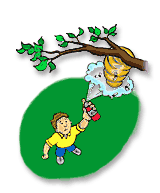 Most insect bites and stings are not serious, but some people may have an allergic reaction and, sometimes, diseases can spread by insect bites.
Most insect bites and stings are not serious, but some people may have an allergic reaction and, sometimes, diseases can spread by insect bites.
West Nile virus is the most recent mosquito-borne illness in the news. West Nile virus causes flu-like symptoms in people, but it can have fatal complications in some cases.
Lyme disease is the most-common disease spread by deer ticks, and reported cases are on the rise. Dog ticks can transmit Rocky Mountain spotted fever.
Safety Tips
The best protection is not to get bitten or stung. These safety tips can help:
- Wear insect repellent containing diethyltoluamide (DEET) when you go outside. For children, only use products that contain less than 10 percent DEET. Consult your pediatrician before using these products on a small child.
- Wearing long pants tucked into socks and a long-sleeved shirt help protect you against mosquitoes and ticks.
- Light colored clothing makes ticks easier to spot and also makes you less attractive to bees.
- Check frequently for ticks when you are outdoors or in the woods. Deer ticks are very small—the size of the head of a pin. Dog ticks are larger.
- Make sure there is no standing water in your yard, such as water in buckets and stagnant ponds or birdbaths. Mosquitoes like to lay their eggs in standing water.
- Be careful at picnics. Sweet foods and drinks attract bees and wasps. Keep food—and the trashcan—covered.
- Don’t wear sweet-smelling perfume.
- Be careful when mowing the lawn and wear shoes outside in the grass in case you step on a bee.
- Stay away from beehives and wasp nests.
- Don’t try to swat bees or wasps with your hands. It makes them angry. Stand still and they should just go away.
- Be careful near woodpiles, sheds, dark corners of the garage and other places spiders may call home.
If bitten or stung:
- If bitten by a mosquito, try not to scratch. Scratching irritates the bite and may cause infection.
- Contact the doctor if you have flu-like symptoms and suspect West Nile virus.
- Remove ticks with tweezers as soon as they are found. Grab them as close to the skin as possible and pull the tick up and out.
- See a doctor if symptoms of Lyme disease or Rocky Mountain spotted fever appear. Symptoms of Lyme disease include fever, aches and fatigue. There may also be a bull’s-eye rash around the site of the bite. Symptoms of Rocky Mountain spotted fever include fever, aches, nausea and vomiting.
- If stung by a honeybee, do not pull the stinger out. Honeybee stingers have a small hook at the end. They will eventually fall out on their own.
- If stung by a wasp or hornet, leave the area immediately. These insects can sting repeatedly. Gently scrape the stinger off using the edge of a credit card or your fingernail. You might squeeze more venom into the skin if you use tweezers.
- Bee, wasp and hornet stings may feel hot and itch. A red bump or swelling may appear where the sting was. Treat bee and wasp stings by washing the area with soap and water, then applying cold water or ice.
- If there appears to be an allergic reaction to a sting—hives, nausea, fever or trouble breathing—go to the emergency room.
- If bitten by a black widow or brown recluse spider, go to the emergency room.









 Most insect bites and stings are not serious, but some people may have an allergic reaction and, sometimes, diseases can spread by insect bites.
Most insect bites and stings are not serious, but some people may have an allergic reaction and, sometimes, diseases can spread by insect bites.